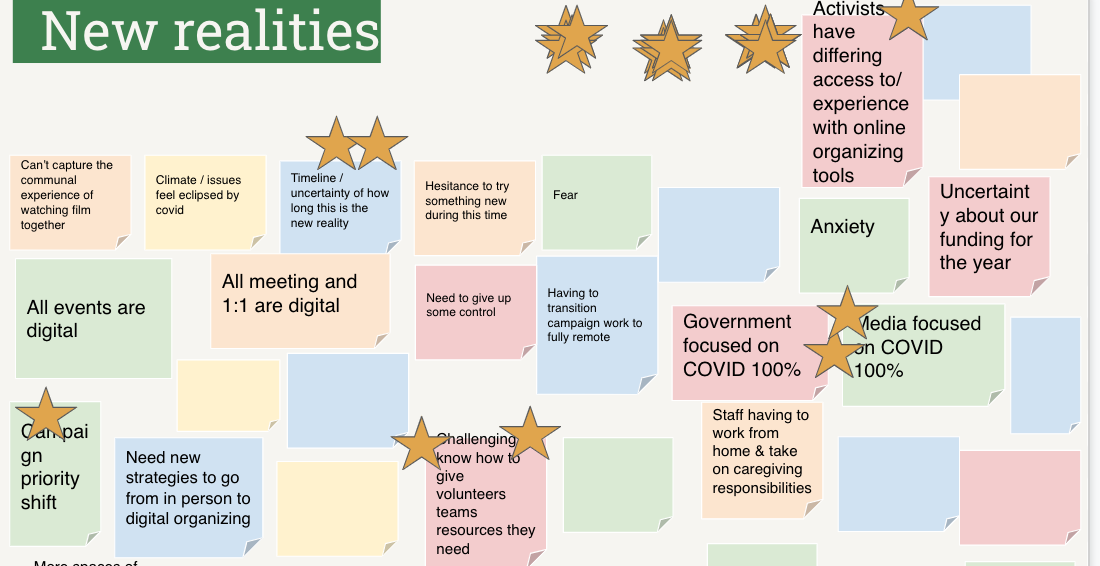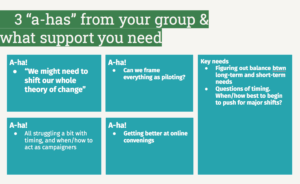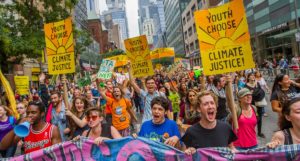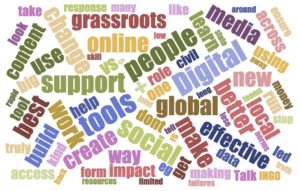On 25-26 March, we hosted two Community Calls with more than 150 dear campaigners, trainers, facilitators, and changemakers from our network – with many new and old faces alike. While MobLab held the space to have these conversations, and facilitated conversations ranging from remote work collaboration to shared challenges to current campaigning experiences, we came up with new understandings together.
Here are some of our collective “aha” moments.
This is a time to rethink strategy and external communications, whether you’re pressing pause on your campaigns and organisational work or shifting them entirely. Re-strategising is important, and there will be a moment for you to work on your issues in the future, with an even stronger base if you support them in other ways right now, such as by listening, giving additional funding, giving staff PTO and opening up space to contribute to mutual aid efforts, focusing on first responder organisations and more. An engaged/active base is the result of building trust by being relevant and sensitive to the moment at hand (regardless of what they usually work on).
Groups have cited that “new campaigns are taking new shape and others being put on hold.” For those who are putting their work on hold, some believe that a “window of opportunity for ‘our’ story might come sooner than we think”. Many people inherently understood that this is a moment that should centre communities, not organisations.
For those who are responding right now, here are useful framing and narrative tips that our network surfaced:
- Underscore our shared humanity
- Connect to more topline human rights messaging
- Lean into the intersectionalities of our issues
- Work together with other organisations and campaigning groups in concert so that messaging doesn’t seem isolated or tone-deaf.
Topline social justice communications and narrative should centre intersectionality and interdependence. Some participants recognised intersections between different issues and how they connect. The crisis has a unifying effect for civil society that can, with the right encouragement, bring a greater willingness to set aside differences and focus on large wins for everybody, with an emphasis on those most vulnerable and most impacted.
There’s no going back. For many of us, it was shocking to see things that we had been campaigning for so long suddenly materialise – which made us realise how possible they were all along: “What is necessary to “lock-in” the decisions that have progressive effects, such as housing for the poor, universal income, access to healthcare, and much more?”
We need to be visible, present, and participating, because decisions about human rights and lives are being made right now. Leaning on interdependence and intersectionality as values for our strategy and messaging, organisations can “show up” right now for their constituencies, and also come together. This is a moment for us to be useful to our constituencies: “From policy engagement to public engagement, we can work on strengthening our base” – but also form new relationships, alliances, and coalitions with other actors in the field for broader and louder human rights work.
Our work is necessary in this crisis and in the many months that will follow. Swift, top-down changes are happening and many are happening unnoticed. Meanwhile, bad actors will take advantage of this moment to prey on vulnerable groups, increase racist, xenophobic rhetoric, destroy the environment, sell data, and more. We need to constantly monitor for changes in the human rights landscape. At the same time, there is now a possibility to engage many new people in social justice work, and this collective experience of outrage will certainly be a driving motivation. Our missions are more relevant than ever.
During these two calls, new needs for groups to be effective at this time surfaced. What do organisations and community groups need now?
Equity + Access
- Guidance for working with grassroots organisers who can’t be physically with their communities
- Approaches for working with vulnerable groups that lack digital access
Creative Collaboration + Knowledge-Sharing
- Training in digital organising
- More ways to exchange lessons and collaborate on new intersectional campaign concepts and ideas
Strategic Realignment + Campaign Support
- Examples and lessons from organisations adapting and evolving their strategies in response to coronavirus
- Support for re-aligning, re-designing and collaborating on strategy – remotely
- Tools and support for enabling creativity – to develop innovative new strategies and tactics more quickly
MobLab will prioritise these needs going forward – through our training programmes, and by working to secure resources that meet needs centred on equity and access. We are also investing additional energy and resources to facilitate more peer learning, support, documentation and cross-sector collaboration during this crisis. We’ve written more about our adaptations and advice for campaigners for creative campaigning in these times here.
“This moment feels temporary, but it will shape everything we do going forward”. In the words of one of the breakout groups during a Community Call: “Collaboration will save us. Community will save us”.




